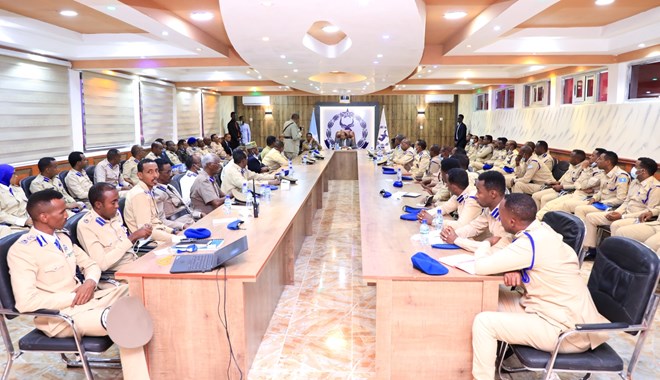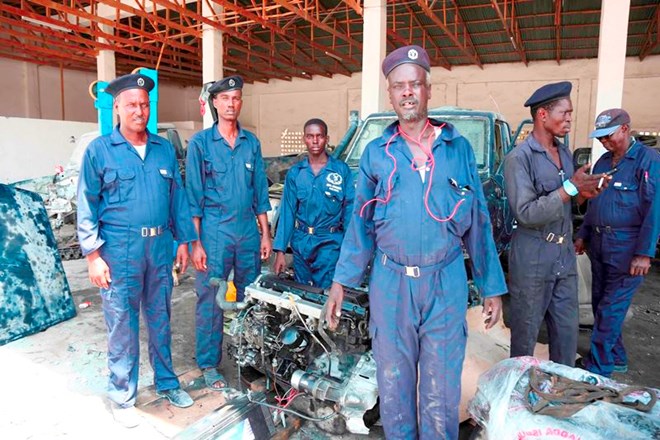By Waheid Siraach
Saturday September 24, 2022

A police officer's role in society is to maintain public order and safety by protecting members of the public and their property, enforcing laws, preventing, reducing, and investigating crimes, and improving citizens' quality of life.
Unfortunately, this is not the case with the Somali Police Force (SPF), and the threat to social order hangs perilously in the balance while the country pays the ultimate price.
One must submit that there have been efforts to repair and rebuild the police department by new Somali governments with the support of international donors. Yet, the SPF remains disorganized, disjointed, archaic, and ineffective. This is partly due to an overarching lack of leadership within the police force. And while the SPF has undergone several leadership changes in the past decade, they were primarily inexperienced and underprepared to effect meaningful changes on vital critical issues on safety, security, and reform.
Challenges indeed plague the SPF; among them, the vast majority of the approximately ten thousand personnel are heavily concentrated in the nation's capital, and the presence of the SPF (a federal entity) is virtually nonexistent outside the nation's capital city. And even in Mogadishu, the department often engages in non-police work while providing minimal police services to the citizens who require them, which begs the question if the agency understands its legal mandate.
As a result of this ambiguity, Mogadishu often falls victim to violent crimes and terrorist attacks, including the most recent assault at Hayat Hotel on August 20, killing 20 people and injuring a dozen others, another indication that the department lacks a sound policing strategy necessary to combat the terrorism.
It's important to note that the department operates under the outdated Somali Police Act of 1972, an Act that went into effect when the country had one central government and operated under military rule. With the nation embracing federalism, the Act is no longer practical and requires revision. And while the New Policing Model Agreement signed by Federal Government and the Member States does define two distinct policing levels (state and federal), it fails to identify these departments' roles and responsibilities, a clear and present oversight.
The SPF also struggles with insufficient policies and procedures. As such, police forces are operating without procedural direction or guidance. Officers' daily responsibilities are ambiguous, and even the highest-ranking officers are forced to navigate within a vague and, at times, nonexistent work structure.
This type of ambiguousness allows department superiors to operate as they please, with little oversight and almost no accountability. And department officers follow their lead. Approximately one-third of the department's personnel engage in outside 24/7 private security details for current and former government workers and other individuals with government ties to supplement their income.
Other members of the force work full-time in units with no policing requirements at all (for instance, Qaybta Dhimaha or Gaadiidka). Some sworn federal police officers work as performers (Fanaaniinta Qooxda Heegan) while being paid by the SPF. The primary duties of others include preparing tea for their superior officers rather than performing actual and necessary police work. And in the instance that an SPF officer might be assigned to a station, duties are typically limited to manning checkpoints in hopes of locating Al-Shabaab.
The Criminal Investigation Division (the nation's highest investigative body) is primarily tasked with issuing police clearance letters and performs little or no actual police investigations.

Police maintenance department
These are just a few issues that have hampered the SPF's operational capacity and capability and destroyed the institution's public trust. And with legal and leadership problems constraining the force, the department struggles to provide essential police services to the citizens.
Though perhaps time-consuming, the solutions are certainly not beyond the realm of possibilities. To become an effective and efficient federal law enforcement agency, the SPF requires bold and innovative leadership with deep policing knowledge and a clear vision. The department requires a new Police Act that clearly defines its legal authority, jurisdiction, and code of conduct. Knowledgeable police leadership can work with appropriate governmental ministries and parliamentary leaders to establish a forward-thinking direction and a structural purpose.
Agents of the police force must prioritize their policing duties over any personal security details or other unnecessary and unessential assignments. In addition, the SPF must create a reliable training and professional development system, and police officers must be fully dedicated to the roles and responsibilities of the position.
The SPF must clearly define its officers' job descriptions, including the expectations of each employee on a daily, weekly, monthly, quarterly, and yearly basis. Perhaps most importantly, officers must work directly in the communities where they can make the most impact. Foot patrols, community safety meetings, and awareness programs will be integral to regaining the level of community trust that has been missing for far too long, as well as improving the overall welfare of the citizens.
Political favoritism, illegal use of force, and other unethical practices can damage relationships between police and their communities. The department should avoid such behaviors and establish policies to ensure impartiality and good judgment. And when incidents occur, the agency must be transparent with the public and provide any relevant information that the public needs to know.
The corrective actions outlined above are attainable once a leadership hierarchy is established and a legal framework is defined. These steps will go a long way towards regaining community trust and offering hope for the future of policing in Somalia. There is no better time to act than now as the military continues to liberate more regions that will require policing services. We are at a pivotal time in Somali law enforcement history, and our next police leaders have an opportunity to course-correct and set a new path.
Waheid Siraach is a former Police Seargent in Minnesota. He traveled to Somalia and assisted the Somali Police Force (SPF) for a year while on sabbatical leave. He currently maintains a residence in Mogadishu and closely follows the development of the Somali police.